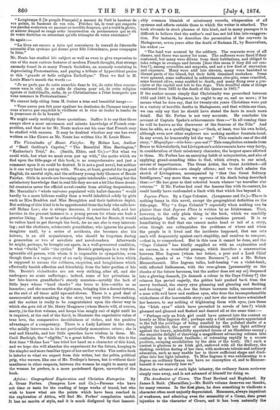Africa: Geographical Exploration and Christian Enterprise. By A. Omar Forbes.
(Sampson Low and Co.)—Persons who have not time or taste for the reading of large works of travel, but who wish to know what are the points which have been reached in the exploration of Africa, will find Mr. Forbes' compilation usefal. It has no merits of style, and it is much disfigured by that lament- ably common blemish of missionary records, vituperation of all systems and efforts outside those to which the writer is attached. The book abounds in stock phrases of this kind, and in many passages it is difficult to believe that the author's zeal has not led him into exaggera- tion. For instance, he describes the persecution of the converts in Madagascar, seven years after the death of Radama H., by Ranavalona, his widow :—
"The land was scoured by the soldiery. The converts were of all classes, and there was mercy for none. The sufferers were fined if they confessed, but many were driven from their habitations, and obliged to take refuge in swamps and forests [does this mean if they did not con- fess?], among crocodiles and, serpents, and not a few died of starvation and exposure. Many were sold into slavery, many were banished to distant parts of the island, but their faith remained unshaken. Some were speared, some suffocated in subterranean rice-pits, some cracified„ some burned alive some scalded to death, and many flung over a pre- cipice at the capital and left to the dogs. This dreadful state of things continued from 1835 to the death of the Queen in 1861."
If the author means simply that Christianity was proscribed between 1835 and 1861 in Madagascar, he ought to say so, and no more ; if he means what he does say, that for twenty-six years Christians were put to a variety of horrible deaths in Madagascar, and that within our time, we can only say that he should have stated the facts in much more detail. But Mr. Forbes is not very accurate. He concludes his account of Captain Spoke's achievements thus :—" In all coming time he will be known as the discoverer of the Sources of the Nile." And then he adds, as a qualifying tag :—" Such, at least, was his own belief,. although even now other explorers are seeking another fountain-head. In any event, he honourably led the way." This reminds one of the old story, " Afagnifique—tres-bien—pas ma?!" This compilation extends from Bruce to Schweinfinth, but Livingstone's achievements have very fairly,. in consideration of their missionary character, the largest space allotted to them. Mr. Forbes has an annoying habit of misquotation, and also of applying grand-sounding titles to God, which always, to our mind, savour of impertinence. The Great Artist, the Great Architect—al/ that order of epithets—are simply odious ; and we don't admire the sketch of Livingstone, accompanied by "that One Great Solitary Intelligence," any more than we approve of his death being described thus :—" He has gone to that celestial bourn whence 'no traveller e'er returns.'" If Mr. Forbes had read the famous line with its context, he could hardly have confounded a limit with that which lies beyond it.


































 Previous page
Previous page